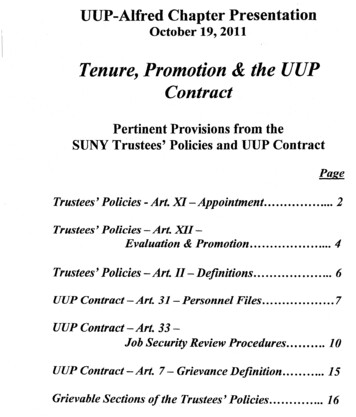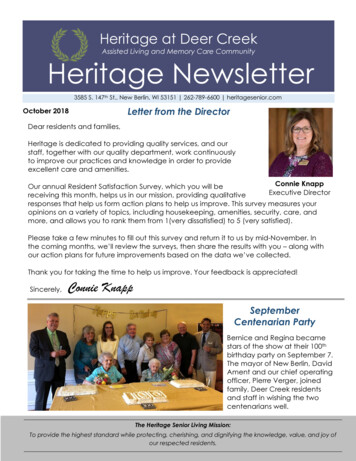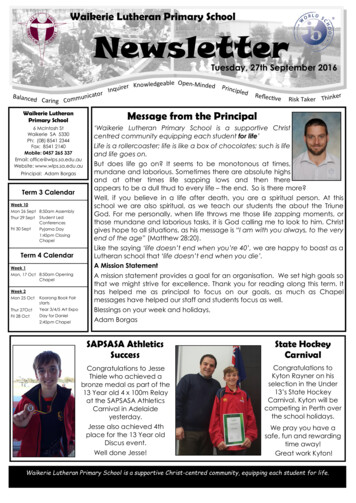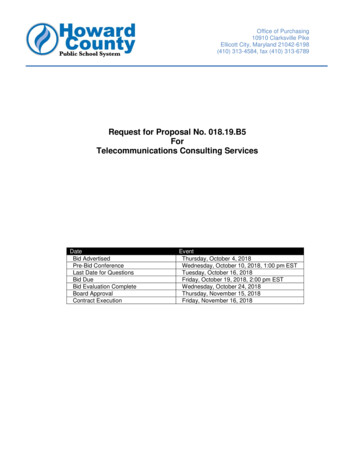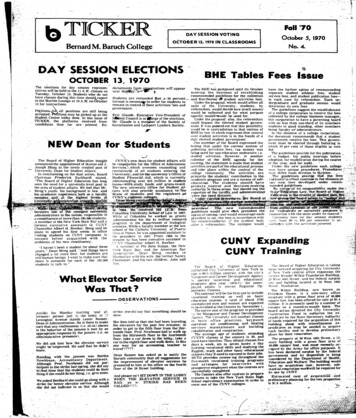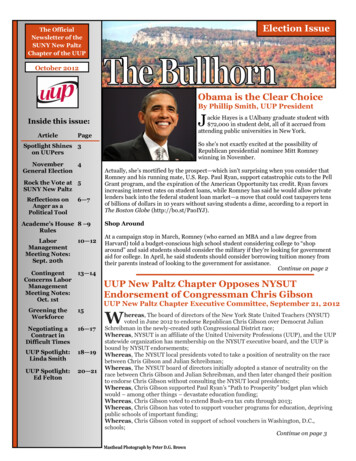
Transcription
Election IssueThe OfficialNewsletter of theSUNY New PaltzChapter of the UUPOctober 2012Obama is the Clear ChoiceBy Phillip Smith, UUP PresidentJackie Hayes is a UAlbany graduate student with 72,000 in student debt, all of it accrued fromattending public universities in New York.Inside this issue:ArticlePageSo she’s not exactly excited at the possibility ofRepublican presidential nominee Mitt Romneywinning in November.Spotlight Shines 3on UUPersNovember4General ElectionRock the Vote at 5SUNY New PaltzReflections onAnger as aPolitical Tool6—7Academe’s House 8 –9RulesLaborManagementMeeting Notes:Sept. 20th10—12ContingentConcerns LaborManagementMeeting Notes:Oct. 1st13—14Greening theWorkforceActually, she’s mortified by the prospect—which isn’t surprising when you consider thatRomney and his running mate, U.S. Rep. Paul Ryan, support catastrophic cuts to the PellGrant program, and the expiration of the American Opportunity tax credit. Ryan favorsincreasing interest rates on student loans, while Romney has said he would allow privatelenders back into the federal student loan market—a move that could cost taxpayers tensof billions of dollars in 10 years without saving students a dime, according to a report inThe Boston Globe (http://bo.st/PaoIYJ).Shop AroundAt a campaign stop in March, Romney (who earned an MBA and a law degree fromHarvard) told a budget-conscious high school student considering college to “shoparound” and said students should consider the military if they’re looking for governmentaid for college. In April, he said students should consider borrowing tuition money fromtheir parents instead of looking to the government for assistance.Continue on page 2UUP New Paltz Chapter Opposes NYSUTEndorsement of Congressman Chris Gibson15Negotiating aContract inDifficult Times16—17UUP Spotlight:Linda Smith18—19UUP Spotlight:Ed Felton20—21UUP New Paltz Chapter Executive Committee, September 21, 2012Whereas, The board of directors of the New York State United Teachers (NYSUT)voted in June 2012 to endorse Republican Chris Gibson over Democrat JulianSchreibman in the newly-created 19th Congressional District race;Whereas, NYSUT is an affiliate of the United University Professions (UUP), and the UUPstatewide organization has membership on the NYSUT executive board, and the UUP isbound by NYSUT endorsements;Whereas, The NYSUT local presidents voted to take a position of neutrality on the racebetween Chris Gibson and Julian Schreibman;Whereas, The NYSUT board of directors initially adopted a stance of neutrality on therace between Chris Gibson and Julian Schreibman, and then later changed their positionto endorse Chris Gibson without consulting the NYSUT local presidents;Whereas, Chris Gibson supported Paul Ryan’s “Path to Prosperity” budget plan whichwould – among other things – devastate education funding;Whereas, Chris Gibson voted to extend Bush-era tax cuts through 2013;Whereas, Chris Gibson has voted to support voucher programs for education, deprivingpublic schools of important funding;Whereas, Chris Gibson voted in support of school vouchers in Washington, D.C.,schools;Continue on page 3Masthead Photograph by Peter D.G. Brown
The BullhornObama is the Clear Choice, continued from p. 1Page 2“Romney wants to make this a conversation about personal responsibility, because if that’s the way theconversation is framed, it will resonate with people with a lot of money and who can afford to pay out thousandsof dollars for college,” according to Jackie, a doctoral candidate in Latin American and Caribbean studies. “Butthat doesn’t help a large majority of students.”“If (Romney) is elected, things are absolutely going to get a lot worse for students, no doubt about it.”Jackie, a student activist with New York Students Rising, knows what worse looks like. She figures she’ll have topay between 400 and 600 monthly for the next 25 years to dig her way out of student debt—and she’sdoubtful that she’ll ever be able to own a home, or even a car. And, as a graduate student, interest on herstudent loans now accrues while she’s in school, part of a July compromise by Congress that prevented adoubling of interest on federal subsidized Stafford loans.Obama KnowsPresident Obama has shown that he understands the importance of an affordable, accessible college educationby raising Pell Grant awards during his tenure in office—an effort that has expanded the program by 50 percentsince 2008. This year, he raised the maximum subsidy to more than 5,600 for 2013-14. The Health Care andEducation Reconciliation Act of 2010 bolstered the Pell Grant program and helped student borrowers manageloan debt by capping repayments at 10 percent of their discretionary income and ending government subsidiesto banks making federal student loans.The president also pushed hard over the spring and summer to keep federal student loan interest rates fromdoubling—which would have impacted seven million students nationwide July 1. In late June, he signed an 11 thhour compromise by Congress to keep the interest rate from rising from 3.4 percent to 6.8 percent. Romney wasalso in favor of extending the lower interest rate, a stance that crosses Ryan’s plan to increase student loaninterest rates.Most parents and students realize that a college education is a necessity, not a luxury in the 21st century. Formany low- and middle-income students, borrowing money from their parents isn’t a possibility. State andfederal grants and low-interest federal student loans are the only options they have to pay for college, a realitythat a multimillionaire like Romney doesn’t seem to understand.The Only ChoiceSo let’s recap: Romney would rather have students shop around for the cheapest college tuition and borrowmoney from their parents to pay for school in lieu of a guaranteed federal student loan. And there’s always themilitary for students looking for a little help from Uncle Sam—which was a choice my oldest son made to helppay for medical school.For me, the choice for president couldn’t be clearer: it’s President Obama in 2012.——Reprinted by permission of The Voice.President Barack Obama (D) and Massachusetts GovernorMitt Romney (R) at the first presidential debate
October 2012UUP New Paltz Chapter Opposes NYSUT Endorsement , continued from p. 1Page 3Whereas, Chris Gibson voted in support of increasing the interest rates onstudent loans;Whereas, AFT and NYSUT’s own ranking of Chris Gibson on Educationissues before Congress is a mere 38%;Whereas, Chris Gibson has called for the scaling back or closing down ofthe Department of Education;Whereas, Chris Gibson has voted to prevent the E.P.A. from spendingmoney to enforce its standards regarding the reduction of mercuryemissions from cement plants across the U.S.;Whereas, Chris Gibson has supported building additional nuclear powerplants along the Hudson River;Whereas, Chris Gibson voted in support of the Defense of Marriage Act and this year voted twice againstefforts to repeal it, and opposes same-sex marriage;Whereas, Chris Gibson voted to restrict the ability of unions to organize and effectively enforce safe laborstandards;Whereas, Chris Gibson was rated at a shockingly low 14% by the United Food and Commercial WorkersInternational Union (a grade of “F” on worker’s issues);Whereas, Chris Gibson voted to ban federal health coverage that includes abortion; andWhereas, A vote for Chris Gibson is also a vote for the anti-labor, anti-education leadership in the U.S. Houseof Representatives;Resolved, That the UUP New Paltz Chapter Executive Committee opposes the NYSUT endorsement ofRepresentative Chris Gibson for the 19th Congressional District.Spotlight Shines on UUPersBy Karen L. MattisonAfirst novel by longtime playwrightLarry Carr, a lecturer increative and dramatic writing at SUNY New Paltz,received first-place honors in the 2012 NextGeneration Indie Book Awards.Pancake Hollow Primer (Codhill Press, 2011) detailsthe physical and spiritual journey of a Gulf War vetwho inherits an 1820s Hudson Valley farmhouse.Carr created The SUNY Playwrights’ Project, and hashad 30 of his plays and theater pieces producedthroughout the U.S. and Europe. His prose and poetryhave been published and performed throughout thecountry.Sheila Schwartz, a professor emeritus atSUNY New Paltz, recently published her19th book, a bio-graphy on the literary highsand personal lows of F. Scott Fitzgerald(Haus Publishing, 2012).Schwartz, who turned 86 in March, haswritten fiction, nonfiction and young adultnovels. She has also published academic textsand more than a hundred articles and bookreviews. For many years, she spent twomonths each year teaching in Mexico.She has received numerous literary awards ofexcellence, and won a Fulbright Award forteaching and research in Ireland.———Reprinted by permission of The Voice
The BullhornPage 4November General ElectionAnyone still debating which presidential candidate will do more for public education and the middle classshould ask Jackie Hayes for advice.Hayes, a UAlbany doctoral candidate in Latin American and Caribbean studies, is faced with 72,000 in studentdebt. For her, the choice is simple: President Barack Obama.Her story—spelled out in President Phil Smith’s To the Point column —is not unique. The federal ConsumerFinancial Protection Bureau reported this spring that student debt hit a crippling 1 trillion. Two-thirds ofcollege seniors left school in 2010 with an average of 25,250 in debt loans, according to the Institute for CollegeAccess and Success; that report also noted that 61 percent of New York state students graduated in debt.Those are some of the reasons the AFL-CIO and the AFT endorsed President Obama for a second term. And whyNYSUT and UUP threw their collective support behind local, state and federal candidates who are pro-educationand pro-labor. A story on the NYSUT endorsement process and a complete list of endorsed candidates can befound on pages 8-9.Other reasons are spelled out in a side-by-side comparison of the candidates’ views on education compiled bythe AFT, below.Reprinted bypermission ofThe Voice
October 2012Page 5Rock the Vote: A SUNY New Paltz UpdateBy Jaime Burns, Chapter Intern, Rock the Vote CoordinatorPolitics can befrustrating, butRock the Vote iscertainly not. In fact, asthe New Paltz UUPChapter’s Rock the VoteCoordinator this year, Ihave recognized, andtaken part, in theoverwhelming successstory of studentactivism and youngvoter empowerment on our campus. Rock the Voteis a nation-wide non-partisan effort to mobilizeyoung voters by getting them to register to vote.Adhering to the advice of former UUP Rock theVote Coordinator Brian Obach (Sociology), I joinedin with efforts already started by the campusNYPIRG (New York Public Interest ResearchGroup) chapter since the beginning of thesemester. Their frequent tabling in the StudentUnion and at the Farmer’s Market, along with briefclass presentations, class raps, already made ourcampus a trailblazer in SUNY Rock the Vote effortswith over eight-hundred registered voters in thepast month alone.After scrambling to publish the SeptemberBullhorn, I started attending NYPIRG meetingsevery Wednesday at 3 PM in the humble abode ofStudent Union 426. I found my unique contribution to the effort: a connection with Residence Lifebecause of my previous year on the Residence HallStudent Association Executive Board, advocatingfor resident interests throughout the campus.Spearheading the Residence Life registrationeffort, I registered voters through Residence HallStudent Association Associate Council meetings,the same organization’s Spirit Weekend, and coordinated tabling efforts within the residence hallsduring the evenings of October 9th to 11th. The weektabling in the residence halls will also be crowdedwith many class raps and a Rock the Vote concert.Taking place on October 10th from noon to 5PM onHasbrouck Quad, the concert is a strong effort tograb as many voter registrations as possible beforethe October 12th deadline with local bands andco-sponsored by our UUP chapter.Another huge success story, nestled between thevarious triumphs of SUNY New Paltz Rock theVote efforts throughout the semester, wasNational Voter Registration Day; September 25thwas a well-justified excuse to crank up theregistration efforts by both NYPIRG and yourUUP Rock the Vote Coordinator. As manyNYPIRG interns and helpers were used as possible to spread out our voter registration effortsfrom the Hasbrouck Dining Hall to the AcademicConcourse and other places in between. I stoodbetween the Student Union Atrium and theCoykendall Science Building, attracting potentialregistrants from lunch or their residence halls toclass and visa versa. Considering the campus hasregistered eight-hundred voters prior to this day,accumulating a dozen voter registration formsalone shows success in encouraging studentactivism. Overall, we collected a hundred andsixty-seven registrations on this day alone: thatis a triumph.While registering voters in classroom during thefinal weeks before the deadline, I am amazed atthe constant steady flow of filled registrationforms. Even after registering nearly a thousandvoters on our campus, there are still more votersto register and more students to help engage inthe most fundamental activism: voting. Thestrength of Rock the Vote, an effort to accumulate a mass of young voters, can only be formedwith each individual registration and each individual effort to be some sort of activist in thisincreasingly political world.NYPIRG interns tabling on National VoterRegistration Day in the Student Union Building.
The BullhornPage 6Reflections on Anger as a Political Tool: A Jewish Journeythrough the LGBTQ Struggle, Part IIBy Peri L. Rainbow, Women’s Studies & Humanistic/Multicultural EducationIspent the better part of my daughter’selementary- and middle-school years fightingangrily on her behalf. I fought for gender-neutrallanguage on all parental forms (“parent/guardian”rather than “father /mother”), and I let it be knownthat I expected all families to be represented in curricula and in the school’s libraries. I made sure thatthe Harvest Festival did not take place during theJewish High Holy Days, and I demanded that thevery traditional 8th-grade “home and careers” teacherinclude “other” ways that people can become parentsas he taught about family, parenting, and child development. I was even hired to facilitate in-service professional development training on cultural competency for school staff.Looking back, I’m not sure I gave them much roomto refuse — which sounds a lot like bullying. My emails were cutting, and my face-to-face conversations were brutally honest.“How can my daughter receive a grade of85 when she is failing every test?” I askedher 9th grade math teacher. “What do youmean they ‘self-correct’ and you do notlook at their work? How dare you?”When I saw this teacher take a step back,I softened my approach. I expressed understanding and empathy for her impossible workload. I was aware of her perception that I was a “helicopter mom,”hovering around my daughter’s school.My self-righteous anger, born of oppression, no longer seemed to serve me well.An adjustment was desperately needed.Act. The Violence Against Women Act of 1994 and itsreauthorizations have begun to reflect the actual experience of victims of domestic violence and sexualassault.Much oppression remains in place, however, and theprogress we have made is precarious at best. TheU.S. government still does not recognize same-sexmarriage, which greatly limits our rights and benefits. Thirty-one states have banned same-sex marriage outright — and in many jurisdictions, adoptionby lesbian and gay people is also prohibited. TheNew York State Marriage Equality legislation passedonly with an addendum that permits discriminationby faith-based organizations, and our gay and lesbianmilitary personnel are well-aware that the repeal of“Don’t Ask Don’t Tell” may only last as long asObama’s presidency.There is still an epidemic of suicidesamong young people tormented by theirpeers because of real or perceived homosexuality. Every semester I counsel students, often LGBTQ-identified, mostlyyoung women, who have experiencedsexual assault and harassment on ourcampus.Lesbian, gay, bisexual, and trangenderhistory, which includes many importantpeople, cultural traditions, and socialmovements, remains invisible in schoolcurricula.The merging of public hospitals withfaith-based ones keeps us vulnerable attimes when we most need dignity, reCecilia and Peri in Woodstock, 2009 spect and protection. Public instituBut such an adjustment does not comeeasily. Each time I am set on fire by thetions still fail to recognize our existencelatest injustice, I feel the power of my anger immediwith inclusive language on documents and withinately. The intimate connection I feel to the oppresfacilities — try finding a gender-neutral bathroomsion of women, Jews, and Queer people validates myanywhere!stance.Homophobia has shaped all of our thinking and perClearly, positive changes have occurred inmeates our society. When a group of people fail tothe status of the LGBTQ community. Six U.S. statessee themselves represented in popular culture andand ten countries around the world now grant equalinstitutions, when this group does not share equalmarriage rights to same-sex couples, and Presidentrights or representation in our educational and legalObama has at last endorsed marriage equality. Thesystems, and when this group is constantly and selffederal government has lifted the military’s “Don’trighteously railed against, all people, including theAsk, Don’t Tell” policy, and the New York Stategroup’s constituents themselves, learn that thereBoard of Education has joined the anti-bullyingmust be something wrong with them —for how canmovement by passing the Dignity for All Studentseverything/everyone else be wrong?
October 2012Page 7I lecture on “cultural competency” thesedays, using my own family and personal journey asexamples with which to teach educators and humanservice professionals about safety and diversity.“You seem really nice,” commented one workshopparticipant recently, “but I am religious and I justdon’t believe in homosexuality.”My stomach tightened and I felt rage flooding mybody. I began my fiery retort: I am not the toothfairy, so you don’t get to ‘believe in me’ or not. Unfortunately, you do get to vote on my civil rights!Then I took a deep breath while looking directly intothe eyes of this young African-American woman. “Iam here,” I said quietly. “And I’m going to continueto be here.” Then I left her to contemplate my“demands.”Sometimes it is better to be quiet, and just keepshowing up.My gender and sexuality class has been a showcasefor real change, personal and political. Students areresponsible for creating effective ways to end oppression and violence; their research projects throughoutthe years have included panel discussions, curriculaand lesson plans for all grades, art, music, children’sliterature, and web pages. Their work is often amazing. I am blessed!As I go into my 50s and reflect on the role of angerthroughout my life, however, I realize that I have sooften focused on “fighting the good fight” that I havesometimes neglected to seek peace. I have not alwayscreated a safe space for those who disagree with me(based on everything they have learned in our homophobic society). My classroom has been a chargedenvironment, and while those who “get it” feel liberated, I fear that those who do not “get it” remainalienated. Usually well-intentioned, those peoplehave their own stories, their own truths, which mustbe told, and heard, and understood, before any realprogress can be made, not only in writing new laws,but in opening hearts.I now see how my deep anger about injustice andoppression has been a thread running through mylife’s tapestry. I have intimidated people with myknowledge and passion. I have demanded an almostimpossible standard of understanding and behaviorfrom them. I have forced concessions more than Ihave won understanding; I have forced justice tobloom like a hothouse flower, not like somethingcultivated in my garden. Although I am generally“right,” I am not at peace — and I do not create peacearound me.Yet whenever I look into the eyes of my wife anddaughter, I see the life I want for myself and foreveryone. It is a life of peace with justice, and loveand respect. It is what Tamela and I vowed to giveeach other ten years ago in our ketubah. I want to livethat peace and effect change through it, as I haveeffected change in the past through struggle.Can it be done? Can I find compassion for my oppressor? Can I effect social change by living mindfully andremaining aware of the need for quiet consideration?Can I make this an effective activist tool to pass alongas part of my legacy?And at what point do I get to celebrate the cultures Ihave helped to nurture? Is my fate only to be wandering and wrestling — or can I step into the land of milkand honey and rejoice.Every year at our house we celebrate Purim.Yet I am anti-Purim! I do not want to celebrate waror reenact brutality, no matter how much humor isinvoked. I take offense, on behalf of my Queer community, at the idea that dressing in drag is impossiblyridiculous. Still, we read the Book of Esther; we discuss issues of women’s power and how we must useour bodies and our sexuality to survive; we honor thequiet leadership of our foremother, her shrewdly submissive approach to King Ahasuerus.My tradition — my Jewish, Queer, female, feministtradition — honors all voices, even the quiet ones.Sometimes it is better to be quiet, to wait, to use ourcalm to help others find their own voices, and to learnhow to safely listen to each other.Quiet is not passive, but active and intentional. Quietis an invitation to learn, to join, to understand, tocelebrate.I am learning the lessons of our long-enduring, righteous indignation, and I now seek to couple that withthe ability to take pleasure in our accomplishments,and in our survival against all odds — and to live thepeace we have fought so desperately to achieve.--------Peri L. Rainbow is an author, clinician and educator with over twenty years of experience in her field.Recognized for her treatment of post-traumaticstress, safety, and diversity, she has been teaching atSUNY New Paltz since 1991. Reprinted by permissionfrom Jewish the-glbtqstruggle-11132
The BullhornPage 8Academe’s House RulesBy Steve StreetIn a report onpart-time faculty membersissued by theAmerican Federation ofTeachers inMarch, oneparagraph openswith a stunningline: Adjuncts, itreads, "havevarying degrees of seniority at the institutionswhere they work."The paragraph, in "American Academic: A National Survey of Part-Time/Adjunct Faculty" (http://www.aft.org/pdfs/highered/aa partimefaculty0310.pdf), goes on to parsehow many of the 500 faculty members surveyedhave been teaching at the same institution (60percent), and for how long (six to 20 years). Somuch for the common wisdom that adjuncts arenot worth higher compensation, because we'renot committed to our institutions.Seniority usually indicates measures of job security that increase with service. But the only thingthe word "seniority" means in that AFT report ishow long those surveyed have held onto the samejobs.Few contingent faculty members have seniorityto any degree: It's our very lack of seniority rightsthat make us contingent employees. By workingcontract to contract, we bring institutions bothcost savings and the flexibility that enables themto accommodate fluctuating enrollments andother variables. Some adjuncts have successfullybargained for the right of first refusal whenteaching assignments are made (adjuncts whohave been teaching the longest get offered thecourses first).But more commonly, seniority means nothing foran adjunct. As a new department head told a colleague of mine who had 30 years on the job andwas worried when his next semester's schedulewas delayed, "Part-time faculty have no seniority."That the AFT report didn't distinguish those twodefinitions of a term so crucial to the verypopulation group it claimed to study seemssignificant in a couple of ways. Hart ResearchAssociates, which conducted the survey for theAFT, does make other fine vocabulary distinctions: Its Web site points out that the companydoes "strategic research, not just polling ormarket research," and identifies its goal as "notmerely to furnish interesting information;rather, we aim to provide the relevant decisionmaking recommendations on which successfulplanning is built. . All of us use our skills inevery way we can to work toward the desiredoutcome."Desired outcomes would be dictated by the clients, in this case the AFT, a union that purportsto represent both part- and full-time facultymembers but that didn't catch the fuzzy vocabulary in the report it had commissioned toillustrate its concern, presumably about, andfor, contingent faculty members.In fact, as dismayed adjuncts who posted comments about the report on an e-mail discussiongroup said, the AFT might just as well havecommissioned the fuzziness itself (includingthe finding that most of us love teaching somuch that "compensation appears not to be amajor expectation"), as a way to justify the glacial pace at which the union has achieved contractual gains for contingent faculty membersover the last couple of decades.It's true, as the report's executive summarystates, that the union now "is conducting anextensive national campaign to bring equitablesalary and working conditions to contingentfaculty and also to build a stronger corps of full-time tenured faculty in higher education."However, many adjuncts have questionedwhether AFT and other unions that representboth sets of faculty members are working toward the first goal as hard as they are towardthe second. In practice, the two goals can bemutually exclusive, partly because of budgetlimitations: Given a choice between more tenure-track positions and more money to payadjuncts equitably, how many departmentswould choose the latter? And how many wouldchoose fresh hires to fill the new tenure-tracklines rather than long-serving adjuncts?
October 2012Page 9In our particular industry, credentials rule over experience and other standard criteria for seniority and promotion, and sometimes over judgment and common sense. In most professions, it's accepted that the longeryou do a job, the better you get at it. But that's not perceived as true of adjuncts. In academe, the assumption isthat if you spend more than a couple of years working in contingent teaching positions, something must beseriously wrong with you.Even Hart Research Associates reports that 44 percent of its survey respondents believe they are not given afair shot at full-time positions. The qualification that is preferred over teaching experience is a brand-new degree. "And a lot of the rest is luck," shrugs an exhausted tenure-track colleague, perhaps trying to make me feelbetter.But as with so many of the symptoms of inequity between academe's two faculty tiers, fairness is only part ofthe problem. The other part is damage to the integrity of the institution itself: Too much veneration of credentials introduces a disconnect between declared values and practices, between aims and means.At a recent conference, someone at my dinner table confessed to having been teaching in higher education for24 years, but only the past four on the tenure track."Wow," I said. "Congratulations!" He was an unassuming-looking guy, but I was suddenly awed with what Irealized must have been his hidden reserves of fortitude, not only to survive two decades of contingent teaching but also to have, at last, persuaded at least one institution to see adjunct experience as worthy of additionalsupport. "Do you realize how rare it is to jump tracks like that? That must have taken some doing!""Not really," he said, finishing a mouthful. "You see, I finally just got the degree. I went back and got it." Hewas mumbling, his eyes on his plate, and others at the table, newly credentialed themselves, looked down, too.What we need to put this academic house of ours in order—in a way that we can all be proud of—is fewer of ourown particular definitions, credentials, and procedures, and more of all three that make sense to everyone. Therules shouldn't just benefit the house. That's the difference between colleges and casinos, or it should be.--------------Steve Street, a lecturer in the writing program at Buffalo State College, died of cancer in August. He taughtwriting and literature in colleges and universities since 1980, never on the tenure track. This commentary firstappeared in The Chronicle of Higher Education and is reprinted here by kind permission. 65163
The BullhornPage 10Labor-Management Meeting Notes, September 20th, 2012By Ed Hanley, Chapter SecretaryAdministration Attendees: President Christian, VP DiStefano, ProvostMauceri, Chief of Staff Wright, HR Associate Director PapaUUP Attendees: President Brown, VP Smith, VP Miller, NYSUT LaborRelations Specialist Capowski, Secretary Hanley, Chapter Intern Burns(introductions and photography only).1. Training for Chairs to Advise Faculty. At our last meeting fourmonths ago in May, UUP and management agreed that there wasa need for much more robust training and orientation, especially for new chairs, to be able to advise their faculty in situations where they feel threatened by students. What measures, ifany, have been undertaken or planned thus far?President Brown briefly recapped the issue to open the discussion. ProvostMauceri indicated the issue will be covered in two forums that are now being planned, the first of which will likely
SUNY New Paltz Chapter of the UUP UUP New Paltz Chapter Opposes NYSUT Endorsement of Congressman Chris Gibson UUP New Paltz Chapter Executive Committee, September 21, 2012 Inside this issue: J ackie Hayes is a UAlbany graduate student with 72,000 in student debt, all of it accrued from attending public universities in New York.
